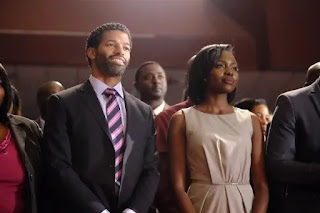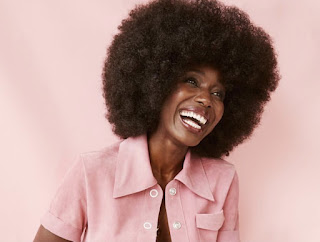 |
| For only nine episodes, Anna Diop played the fiancée of Noah on OWN’s juicy church series Greenleaf. Most of us were not meant to be on her side. |
Oh dearest Isabel.
I apologize for not seeing through to Greenleaf’s problematic gaze sooner. For so long, I was blind to the obvious intentions to make dark-skinned Black women poorly unrootable characters. With Charity’s terrible storylines, Kerissa being cheated on, Zora the Bad Seed, and Isabel, the bitter, unwanted shrew, I should have been the light earlier on. Naturally, we were supposed to be Team Gigi— the light-skinned, long haired leading lady who still desired Noah, the chauffeur— Isabel’s extremely fickle fiancé.
 |
| Isabel (Anna Diop) tried to make Gigi feel small for not having a date to her and Noah’s (Benjamin Patterson) engagement party. |
I revisit Greenleaf with a freshly opened mind now.
Sometimes television shows depict the fiancée/girlfriend as the real side chick— a man’s last desperate quest to commitment despite truly not being one-hundred percent sure. Sex and the City’s Mr. Big still wanted Carrie, Insecure’s Lawrence still wanted Issa, and Harlem’s Issac still wanted Camille. Although Lawrence wasn’t married to his eventual baby mother, Condola, they were in a serious relationship. Mr. Big was married and Issac engaged. When the ex is within sight, the man’s eyes strays to the one who got away, forgetting that his intended exists. In Greenleaf, Noah wanted Gigi the moment she came back home. It was apparent in his gaze, his body language. The undeniable thirst wasn’t necessarily unreturned either. Yet Isabel stayed pressing him on, being every inch the Christian woman mirroring another woman’s behavior. Kerissa likely trapped her polyamorous husband Jacob with the same teasing game.
 |
| Isabel deserved better than Noah and a tired “other woman” story. |
Obviously, the audience is not supposed to champion Isabel. She must be written as unsympathetic as possible so that Gigi, the sainted soulmate, swoops in and takes back her former lover. Isabel withholds sex from Noah, wanting to save it for marriage— an old-fashioned tradition. It is a beautiful pact, not for everyone in the contemporary age. She uses it, however, as a bargaining tool, a chip to keep Noah in line. Except free spirited, lonely Gigi desires Noah too. It doesn’t take long for her to be “ridden hard and put away wet” by Noah. Unfortunately, Isabel puts two and two together. Instead of dumping a cheater who doesn’t love her, she chooses to break her vow, having sex with him. This is disturbing for two reasons— Isabel’s foolish determination to win a man already lost and giving him something he did not deserve.
At the time, I remembered vouching hard for Gigi and Noah. Maybe it was the heightened soapy drama of it all, that forbidden passion, those longing looks. Yet behind my rooting, I wondered what would have happened if Gigi and Isabel switched places. What if Isabel and Noah were the past lovers and Gigi, the jilted fiancée? See the blatant colorism tactics on Greenleaf definitely set out to disservice Isabel and her beautiful portrayer Anna Diop (who leads and puts on a terrific, layered performance in Nikyatu Jusu’s Sundance Grand Jury Prize winning Nanny). She was a victim of the show’s specific agenda. By making the lighter skinned and biracial women characters more desirable and sympathetic, Isabel and others of her complexion had no real chance. Isabel was in the way of “true love” and the slanted writing did her no favors. In addition to this Greenleaf situation, Diop later endured racist fueled hatred for playing an orange character in the DC serial Titans. So that adds an extra layer of regret on past treatment to her and Isabel (mean tweets exist).
We still have much unlearning to do, especially in regards to how dark-skinned Black women are treated in television and film, even in the year 2022.
 |
| Model/actress/activist Anna Diop from Okay Africa’s 100 Women. |
When Isabel and Noah eventually leave town, they sadly marry offscreen— which quite frankly is doomed to fail because Isabel deserves a man who fully loves her. It is another obstacle. This notion that Black women have to settle for less. Isabel likely believes that being far removed from temptation changes a man’s heart, but that’s still the thorn prickling between them. Isabel is not first in Noah’s heart. Although they later divorce (also offscreen), Isabel was in the same rocky boat as Charity Greenleaf. They both married people hiding their true selves. Except in Isabel’s case, she knew that Noah still loved Gigi and Charity had no idea Kevin grappled with his sexuality.
After an ice cold Nina Simone moment of removing myself from a table where love (if you can call it love) was no longer being served, I stopped watching Greenleaf mid season three. The red flags were practically bursting at the seams. The once guilty pleasure made me feel guilty for being a dark-skinned Black woman watching those looking like me getting shafted, treated like second best (or last best in Isabel’s case). There was nothing or no one to celebrate or root for. Charity continued falling in a downward spiral, Zora stayed abused, and Kerissa schemed and schemed over a man who still kept cheating.
We the offended should have followed in Isabel’s footsteps in Greenleaf. We should have up and left the poisonous realm that the Calvary provided too. The whole environment was unhealthy and toxic. In a caring, promising future, writers must be able to craft out supportive, compassionate spaces for gorgeous, dark-skinned Black women like Isabel who shouldn’t have to change and/or sacrifice herself in order to obtain an unwilling man.
This is a genuine sorry to Isabel (and Anna Diop) and the other dark-skinned Black women characters partaking in a predictable story that we all know so well. We reject with a full, valiant heart.
Isabel deserved better.
The audience deserved better.
I'm rewatching right now and you are absolutely right. The colourism is shocking and even more disappointing because Oprah, a darker women was at the helm. None of the dark skinned women in Greenleaf are likeable or get a 'happy ending'. the colourism even extends to Sophia and Zora where the light skinned cousin is portrayed as innocent and the dark skinned one as a corrupting force.
ReplyDelete